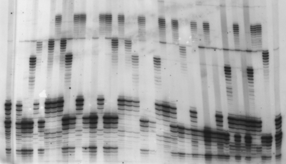|
|
 |
     |
|
Multiple paternity in the Surinam olive ridley and leatherback In
order to study the reproductive biology of olive ridley and leatherback turtles nesting in Suriname, Biotopic has carried out a genetic study on the occurrence of multiple paternity in these species. Multiple paternity occurs when several fathers fertilise the eggs of a single clutch. It has been shown to occur in a wide variety of species, including birds, fish, mammals and reptiles including marine turtles. It is believed that multiple paternity provides direct or indirect benefits to females, such as increased hatching success and offspring viability. Also, multiple paternity is thought to increase the effective population size, thus promoting the maintainance of genetic variation in endangered populations. In
this project, microsatellite analysis has been used to assess the occurrence of multiple paternity in the Surinam olive ridley and leatherback populations. Bloodsamples from nesting females and hatchlings were collected during the 1995 and 1997 nesting seasons in the Galibi Nature Reserve in Suriname. The genetic analysis was carried out in 1998 and 1999 at the Institute for Biodiversity and Ecosystem Dynamics (IBED) at the University of Amsterdam, the Netherlands. For
the olive ridley, we observed multiple paternity in two out of ten clutches (20% multiple paternity). In addition, we discovered an unusual mutation pattern: all of the microsatllite mutations that we observed were of maternal origin. The results were presented in 1999 at the 19th Annual Symposium on Sea Turtle Biology and Conservation at South Padre Island, Texas. In 2002, the results were published in the August issue of Heredity: "Multiple paternity and female-biased mutation at a microsatellite locus in the olive ridley sea turtle (Lepidochelys olivacea). Heredity 89:107-113. For
the leatherback sea turtle, eight clutches were analysed. Multiple paternity could not detected in the sampled clutches, and we conclude that the level of multiple paternity in the Surinam leatherback population is low, if present at all. A publication on the leatherback data is currently in preparation.
|
|

|
Sequence gel of microsatellite alleles (Ei8) showing the occurrence of multiple paternity in an olive ridley sea turtle clutch. By comparing the genotypes of the hatchlings to that of their mother, four different paternal alleles can be identified in the offspring, indicating that this clutch was sired by at least two males. |
|
|
|
This
project was funded by the Beijerinck-Popping Foundation, the Treub society and WWF international. |
|
|
|
|
|
|
© | Biotopic |
 |
|
|
|